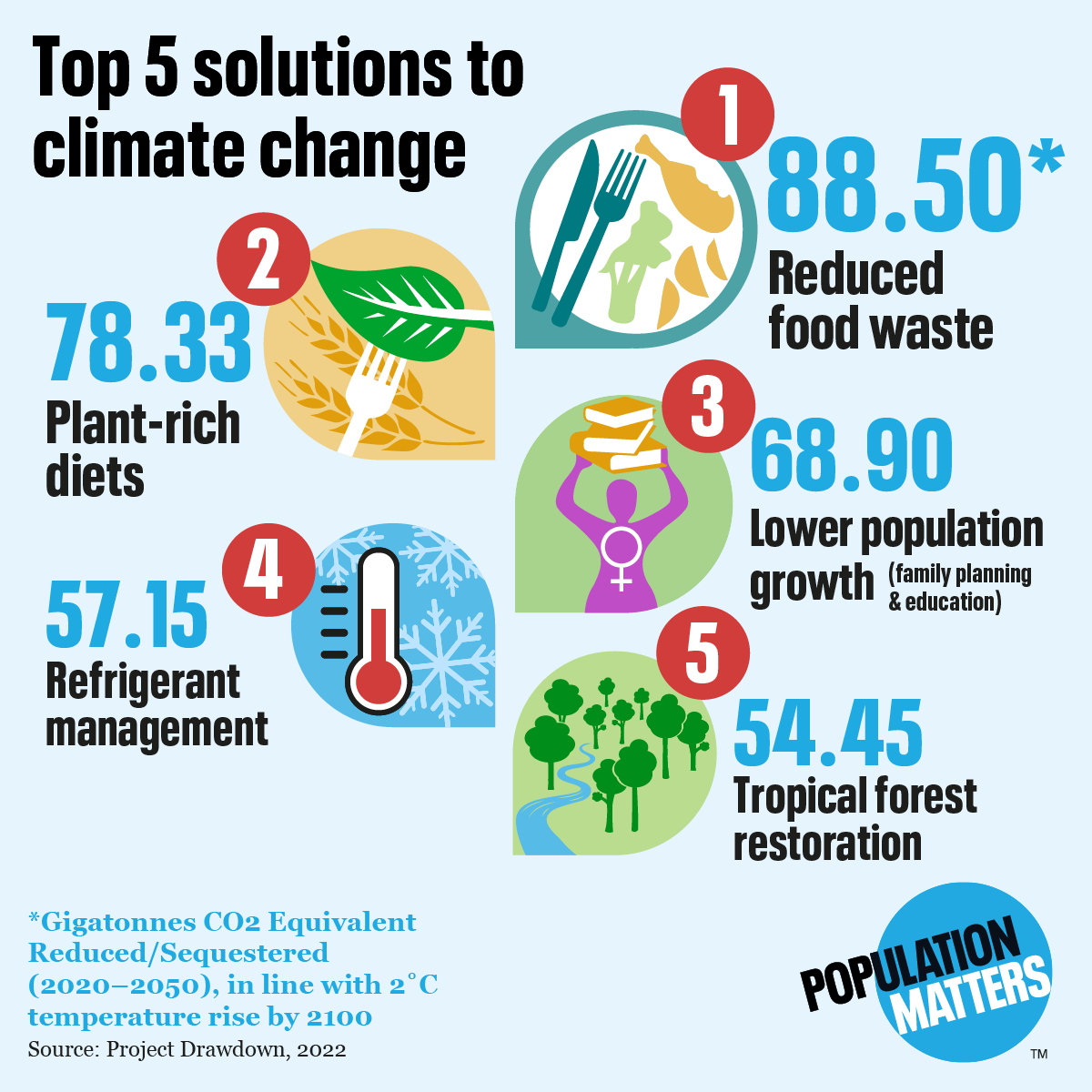
THE CLIMATE CRISIS: ETHICAL POPULATION ACTION A KEY SOLUTION
In late June, Project Drawdown, the world-leading study of climate change solutions, published updated information on a range of solutions to reduce carbon emissions globally. Family planning and education, resulting in slower population growth, were rated as key to tackling the climate crisis. Population Matters’ Senior Campaigner, Andrew Howard, crunches the numbers and analyses what they mean.
PROJECT DRAWDOWN – THE 2020 STATS
In 2020, Project Drawdown published updated analysis of 82 practical policy options for minimising carbon emissions globally. These ranged from plant-based diets and refrigerant management to insulation and electric cars.
It also looked at the value of ethical population actions to address climate change under a solution called ‘Reproductive Rights and Education’. It stated:
”as we consider the future of climate solutions, it matters how many people will be eating, moving, plugging in, building, buying, using, wasting, and all the rest. Population interacts with the primary drivers of emissions: production and consumption, largely fossil-fuelled.”
It concluded that empowering voluntary actions to bend population growth to the UN’s 2019 medium projection of 9.7 billion people by 2050 would save 85 gigatonnes of emissions by 2050. This made these actions the second most effective solution in limiting global warming to 2°C above pre-industrial levels (the first was reducing food waste), and the fifth most effective in limiting warming to 1.5°C, by the year 2100.
This also made these ethical population actions a more effective climate solution in the 2°C scenario than all popular technological solutions, including electric cars, onshore and offshore wind turbines, and solar and nuclear power.

THE ‘FAMILY PLANNING AND EDUCATION’ SOLUTION
Project Drawdown’s 2022 update, which included eleven new climate solutions, saw the renaming of the population action solution as ‘Family Planning and Education’. This solution explicitly calls for voluntary family planning for all girls, women and couples around the world, and universal access to quality education for all children.
The update highlighted the many benefits of this solution for people and planet: greater gender equality; inclusive and equitable economic development; better economic opportunities; improved livelihoods; delayed onset of marriage; delayed child-bearing; declines in maternal and child mortality rates, unintended pregnancies and unsafe abortions; better health outcomes across generations; and the empowerment of individuals, and by extension their communities, to be able to adapt to and build resilience against climate change impacts.
It also crucially and explicitly confirmed the importance of family planning and education in tackling population growth and, in turn, climate change:
”Slower population growth, a cascading outcome of increased family planning and rising education levels, contributes to reduced greenhouse gas emissions.”
Project Drawdown stated that increased knowledge about, access to, and quality of voluntary family planning, and twelve years of high-quality education, are essential to achieving the UN’s 2019 medium global population projection of 9.7 billion by 2050 (see note below). It modelled the global impact of this population scenario, which includes increased uptake of family planning and rising education levels (and therefore lower fertility), on energy, building space, food waste and transportation demand versus the status quo; and concluded that fostering equality through this solution could reduce CO2 equivalent emissions by 68.9 gigatonnes by 2050.
(Note: Project Drawdown’s statistics were published a few weeks before the latest UN world population projections, which came out on 11 July 2022. However, the UN’s medium global population projection for 2050 is still 9.7 billion).

This now makes these ethical population actions the third most effective solution (of 93) in limiting global warming to 2°C, and the seventh most effective in limiting warming to 1.5°C, by the year 2100; and in the 2°C scenario, still more effective than each of the technological solutions available.
PM TACKLING RESISTANCE TO THE POPULATION MESSAGE
Project Drawdown’s findings clearly show that family planning and education are crucial for helping people to cope with the effects of climate change (adaptation and resilience-building), and for reducing the severity of climate change (mitigation) by slowing population growth and helping to cut emissions.
The findings also echo the authoritative reports of the Intergovernmental Panel on Climate Change (IPCC) in recent years, which have stated clearly that population growth is a driver of climate change. In the third instalment of its Sixth Assessment Report, Climate Change 2022: Mitigation of Climate Change, in April 2022, the IPCC stated:
”Globally, GDP per capita and population growth remained the strongest drivers of CO2 emissions from fossil fuel combustion in the last decade (robust evidence, high agreement).”
Despite this overwhelming evidence that ethical population solutions are climate change mitigation measures, PM has found strong resistance from governments and other key stakeholders in the climate change field, including organisations promoting sexual and reproductive health and rights (SRHR). In response to our lobbying on this issue in the run-up to the COP26 climate change conference in Glasgow in November 2021, the SRHR section of the UK’s Foreign, Commonwealth and Development Office stated:
”On family planning specifically, the evidence shows that it is growth in levels of consumption driven by unsustainable development that influences carbon emissions and increases climate change, rather than population growth itself. Family planning is therefore not a climate mitigation strategy.”
While PM also promotes the critical message that tackling unsustainable levels of consumption in high-income countries is crucial in fighting the climate crisis, we will also continue to be vocal in promoting the fact that these ethical population solutions must be acknowledged and funded as climate mitigation measures.



